Uli Jon Roth (ex Scorpions guitarist) talks about his 40th Anniversary Tour, Sky Academy, Hendrix and much more

Legendary guitarist Uli Jon Roth is set to have another amazing year in 2013, beginning with a North American tour (celebrating his involvement on the first five Scorpions LPs) which kicks off in L.A. this week. Each date of this tour will be recorded for an upcoming double live cd/dvd release highlighting these classic Scorps cuts and will also feature original tour footage from 1973-78 as well . As if that wasn’t enough, he will also continue doing his Sky Academy instructional seminars before kicking off the summer with Michael Schenker on a South American co-headlining run. It’s always so refreshing when such an influential and essential artist as Uli comes across as down to earth and caring as he did during the course of our interview, he is truly a fun guy to talk to and it was an honor to speak with him. We covered some of the classic Scorpions stuff, what he enjoys about helping other people through music and also spent some time talking about Jimi Hendrix and music history in general. Read on….
Legendary Rock Interviews: You are set to see us all here in the United States again for this upcoming 40th anniversary tour celebrating the original Scorpions material. How are you feeling about that?
Uli Jon Roth: It’s something I’m really looking forward to for a number of reasons one of them being that the timing feels so right. Sometimes I’ve done things and I’m thinking “Maybe this is not the right thing at the right time” (laughs) but this just feels like it’s all coming together very nicely. I’ve been onstage performing the Scorpions material for the last few years now and that is after not having done that during stretches of my career, whether it was during the Electric Sun days or otherwise. I really wasn’t playing any of that stuff live and I basically didn’t enjoy it as well, my mind had gone to a completely different place. Some years ago, maybe due to popular request or whatever it was I started playing a few of them and initially I didn’t really have the right connection with them. It took me some time to really, really decipher the code. I could play it but I just didn’t feel quite comfortable with it. Then recently, more and more, something has changed and I am really enjoying playing these songs and feeling comfortable with them. It almost feels like I’ve reconnected with something and that’s always interesting you know? To reconnect with that part of my past is interesting and I am taking it really seriously and we are going to be playing a really good cross-section of the stuff from that era that was really my favorite material from the time when I was with the Scorpions. That’s not necessarily just the things that I wrote either, there are some things that Rudolf (Schenker, guitarist) and Klaus (Meine, vocalist) wrote where I just contributed the guitar parts and some of the arrangements. We are going to be playing tracks from each of these five albums and I want to make sure it’s presented as good as it can be so we are bringing a big band with seven people onstage, keyboards, three guitar players and two vocalists. I feel that way we can do justice to the stuff that’s on the albums because on the albums we have lots of multiple guitar parts and I was never satisfied with some of them live before. A song like “In Trance” has all of these big harmony guitar parts and then live it would always be like the poor man’s version.
LRI: You left the band shortly before the release of the “TOKYO TAPES” album. Were you happy with the performances or the sound of that album ??
Uli: I am very happy with the performances but not so much with the sound. If it were mixed nowadays it would come out sounding infinitely better than it does. I just spoke to Dieter Dierks (legendary Scorpions producer) about this and he completely agreed with that. There were a couple of things that went wrong back then, one of them being a mishap, just something that really shouldn’t have happened. There was a Japanese crew that actually recorded the sound in the mobile and for some really strange reason they didn’t record all the fader settings of the mixing including the EQ’s. This is something that should never happen, it should always be pre-fade or pre-EQ so afterwards you can do a lot with it. A lot of the recordings were…..basically, they ended up having the wrong kind of sound for a lot of that material and I wasn’t happy with the mix either. Other than that, it’s certainly a benchmark album. We are going to be recording every night when we play these shows now on the winter tour we have about 30 dates, so we will have multiple choices of each of these songs in order to make the album as good as we possibly can.
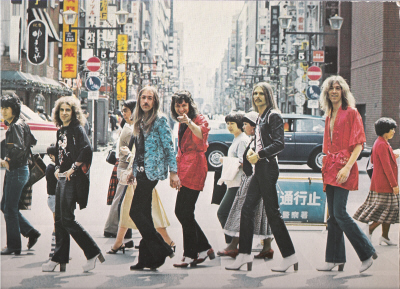
Uli and the Scorpions on the streets of Tokyo
LRI: The album will be only consist of Scorpions material but the actual live shows on this tour will also feature some of your Electric Sun and solo stuff as well correct?
Uli: Oh yes, we always play long shows, never less than two hours, sometimes as much as three hours of music a night with encores and improvisation. Usually I will be onstage with no setlist or only fragments of a setlist and every show is different. I might suddenly play a song that we haven’t played in a long time or the songs might appear in a totally different order, I really never know. Things are usually very spontaneous.
LRI: You are one of those guitarists who is such a pleasure to watch play live because you are so clearly in a zone. A lot of bands, good bands, play good shows that I enjoy but it’s clear they know exactly what they’re going to do and when and how they’re going to do it. These guys may well enjoy playing that way but in some respects its still like performing a job but you never get that feeling watching you play, is that as important to you as ever?
Uli: It is sacred to me and I respect it and love it so much. It is a privilege to be able to be on that stage and it is a privilege to have an audience who come to see you. These people have to travel long distance sometimes and it is a big hassle to have to get to and from shows so to me, whoever is in that audience on a given night, I appreciate the fact that they are even there. Every show is important to me and I want to give my very best under the circumstances and I do take that privilege very seriously. Once we’re up there, it’s very relaxing and very free flow and I just like to celebrate the moment and it’s very different from what you’d call a quote, unquote “professional” show where every moment is choreographed and everything is set in stone nightly, that’s considered proper entertainment but my set is very unpremeditated. Sometimes there are gaps where we are tuning different guitars and things like that so it’s not professional in that sense at all (laughs). It’s off the cuff and unscripted and that’s the way I want it. The thing I want above all is the opportunity to capture the moment between band and audience, that real magic, and to be completely free with it and fly with it. When that happens, those are some of the greatest moments and luckily in every show or almost every show, there are a few of these moments. Sometimes when you’re on the road you’ll have several shows in a row where you’re just completely in the moment and you’re on such a high that it seems you’re in another dimension. That is what I strive for, all the time, to get to that plateau in your mind where the inspiration flows freely. I can only get to that place if it’s not scripted, if it’s not set to a clock.
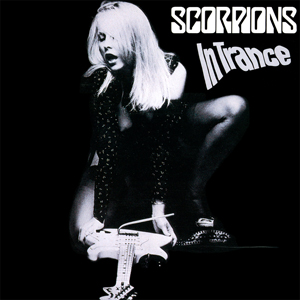
LRI: It sounds like one of the girls blabbing at the mouth at the beginning of Spinal Tap but it really does break down the walls between the band and audience if done properly.
Uli: There shouldn’t be a wall there at all, there shouldn’t be. I mean to me, and this sounds completely cheesy to people, but to me, we’re all brothers and sisters. That’s a very 60s kind of statement but I totally believe that to be true. We are all brothers and sisters.
LRI: The response to your joining the Scorpions for the Wacken 2006 DVD set was intense. A lot of those old songs from your era simply hadn’t been played by the Scorpions in ages. Was that response surprising to them?
Uli: The band was more surprised than I was, I think just because Wacken is seen as such a hardcore heavy metal thing. There was a period in time where the band didn’t have that kind of street cred, they were seen as more of a commercial thing than what you would normally have at Wacken. I think that it was a beneficial move for them to bring Michael Schenker and myself back in for that show and we made it a much more freeflow show. I really brought that idea to the band and said “Comon, lets do it a bit more like in the olden days” and we did. We actually even had some jamming on the stage which for the modern day Scorpions is pretty unheard of but in the 70s when I was there it was a pretty normal thing. The show was different back then and we were a lot more free in what we did, afterwards it became more corporate, more successful and more commercial for sure but also more predictable. During that Wacken show I think some of that went out the window. I’ve never really seen the full DVD but I have seen bits and pieces of it and I know that some of the parts where we jammed were left out, probably because of that corporate aspect. If you were there or saw the full footage of the gig you would understand exactly what I mean.
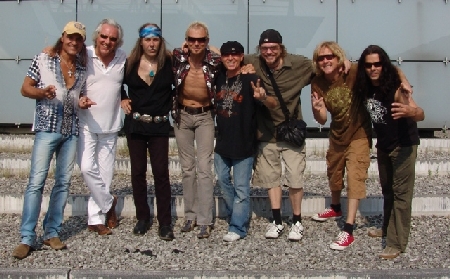
Herman Rarebell, Uli Jon Roth and Michael Schenker rejoined the current Scorpions for the Wacken 2006 DVD package. You must see it to believe it.
LRI: The Virgin Killer album is underrated probably due to the original album cover and the controversy surrounding it but I wanted to ask you a question you are probably sick to death of. The title track is said to have been written by you while on tour with KISS and inspired in some part by Paul Stanley in particular. Is it true you guys really weren’t all that familiar with KISS?
Uli: Yes, that’s true, we really weren’t. It was during their first German tour in 1976 and I believe that Paul Stanley had particularly asked for us to do the shows but we didn’t know who KISS were. So, they came and we supported them on that tour. After that tour, I was in the dressing room and just played this spontaneous riff and I was kind of just messing around saying just the words, “He’s the Virgin Killer” something like that. I think it was Klaus who said “Oh, that’s great, I think that sounds like something” and I knew it did, it was a great hook line and I thought “Ok, there’s something here but now I have to find lyrics” (laughs). Something that were more along my line of thinking (laughs) rather than something obviously KISS or Paul Stanley would write . I think I managed to come up with something that works so I came up with the Virgin Killer, the demon of our times. Basically, the systems that we live in here in the Western world are geared in such a way that young people are prematurely robbed of their childhood, and that’s true even more so today than back when I wrote those lyrics. There’s this pseudo-sexualization of kids, aging them and making them older than need be at 6 or 7 or 8, 9 years old. The availability of heavy duty porn to young kids on the internet, I have seen it myself with some kids and it is unbelievable and very shocking that they are being exposed to this, I really had no idea how it could be so easy for young kids to access that kind of pornography. When I was a kid I lived a normal childhood. A child should be a child and it should be protected and then when puberty comes it’s a totally different ballgame. Basically, that song’s true meaning is about how society robs young people of their true innocence. That’s a very, very true and very sad fact and what I mean by saying “society” is ALL of us, this is what we have allowed our world to become. It’s very much a world where almost anything goes, there’s no right, no wrong anymore, no morals. At the risk of sounding like an old-fashioned preacher, I can only say that it is a pretty sick world in many regards and many people are lost in it and they don’t know whether they are coming or going. There were other ideas I brought into that song and other songs about what was wrong with our world, pollution of our waters and environmental issues but that is the real inspiration of that.
LRI: Aside from things like album covers and whatnot were there other things like the message the band was putting forth that made you feel uncomfortable or against your personal philosophy?
Uli: Yes, first of all, the album covers I did not object to and I should have but I wasn’t mature enough. I was just a kid really and didn’t really have an expanded kind of vision you know? I was just more like a guitar player dabbling in some uncertain philosophy. The awareness came later that things like that shouldn’t have been done in the way that they had been but certainly there were other things after Virgin Killer, lyrics and things like that which I thought were just totally inappropriate only because there was just nothing artistic about them. When I heard a song like “Steamrock Fever” I just kind of shook my head, I mean the Monkees were were writing more artistic lyrics than that. To me, there was just no point whatsoever, no message, it was just rock at it’s shallowest. To me if the song doesn’t say something meaningful then I’m just not interested and I don’t really want to be associated with it because I am just not feeling that way. I see the world as a world of artistic expression and I’ve always seen myself as an artist and there are standards beyond just craftsmanship. Art is something higher than craftsmanship, it’s like the higher octave of craftsmanship. If I see myself as an artist then I have a certain feeling of responsibility to stay within that frequency. If I don’t then I feel like I am not an artist anymore or I am a bad artist or a fake, pretend artist.
LRI: I know you have been cited before as an influence on so many players but one that comes to mind is Billy Corgan of Smashing Pumpkins. He is another person who is adamant about having a vision for his art and music. Can you relate to that part of him?
Uli: Absolutely, that’s Billy, that is. We have interacted on a few occasions onstage as well, which you may know, we played on a really big stage in front of 80,000 people in Germany and we jammed together for a long time which was a great moment. We had a TV show together which was an hour’s worth of us roving through the city of Hamburg and just being filmed in the process and there was nothing really contrived about that, in fact that was very interesting. Billy is certainly one of the few people in the business who is really contributing something of artistic value. When it comes down to it, I just don’t see a lot of it out there unfortunately although there is a lot of great talent. Those with great talent don’t always choose the controversial path of artistic integrity they generally go wherever they think the success is or whatever. That’s not to say Billy is not aware of that because actually he is and he’s a very commercially minded person, totally different from me and much more in tune with those things than I am. He is also a businessman and his success is a combination of all of those factors but rooted of course in those steadfast qualities of his as an artist. He’s a strange mixture of both and knows when to make the commercial decisions that he wants to make. He’s certainly a great guitarist and it was really a pleasure to jam with him, most people can’t really do that in their set, to actually stretch and jam for a half hour and produce real music is unheard of.
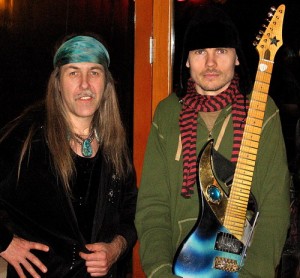
LRI: Is there a particular Scorpions song from the time after you left the band that is your personal favorite?
Uli: I LOVE “Send Me An Angel”. I think that’s the greatest song they’ve ever written and they have written so many great tunes over the years. Rudolf and Klaus are just a fantastic team and they only got better and better as the years went on.
LRI: Who are the two lead singers you’ll be taking out on this tour?
Uli: Henning Basse and Niklas Turmann. Henning did one world tour fronting the band FIREWIND, working with Gus G. Great talent, great voice, totally different from Klaus which is the way I wanted it. I wanted to do something a little different. The other guy Niklas is also one of the two guitar players who are on the tour and he is from Germany as well and he’s been with me since 2008 and also has his own band called Crystal Breed. He also has a great, unique voice and they can both perfectly harmonize so we will have all of the harmony vocals intact for these Scorpions songs which I think is very important. A lot of times when they are performed live it feels like those are missing but now we are going to have them.
LRI: I am one of those kids who was turned off to music instruction because of the boring nature and rigidity of lessons so I was really pleased to hear about your Sky Academy seminars. I have never heard of any music clinics or training like this before hearing about this, had you?
Uli: No, I had not heard of anyone else doing it and that’s why I guess I had the idea in the first place. I felt that there was a need to say important things that were being avoided or left out, the kind of things that were never mentioned in music schools or conservatories, at least not to my knowledge. I’ve always been interested in the metaphysics of music, like why a certain chord strikes a certain feeling in you. Why does a major chord feel different from a minor or diminished chord and how to explain that in order to put a finger on it. I realized early on that each note of the twelve has a completely different feeling or color attached and together they are like a rainbow spectrum of life and these notes which are nothing more than frequencies which rule everything that the universe is made of. I realized that those frequencies are also in us and we are music just like the music we listen to. We are made out of music in many respects because we are resonating according to musical laws. Our bodies are like that, our minds are like that and even our souls and I have always found that fascinating. I have delved into it a lot in the last 40 years or so and gradually a big picture emerged and it became clearer and clearer and I realized that a lot of that knowledge is potentially very helpful to a lot of people. That it helped make me the player that I am. A lot of it also has to do with Psychology and prayers, I call it “The Way of Inspiration” or learning how to interact with inspiration to learn how to attract it, use it, shape it and direct it and then of course there is the whole range of the instrument itself. The guitar is really just the starting point for Sky Academy though and quite often we have people at the seminars who are not guitarists, we’ve had drummers, bass players and even just people who enjoy and love music. Usually there is something in the program for all of these people. I do go into guitar techniques when I have a whole bunch of guitar players in front of me but the underlying purpose of Sky Academy is a different one from the typical guitar lessons we are used to. The side benefit if it works for someone is that the person will learn to become a better player but for me the important thing is to try and open up certain vistas or avenues in people’s minds who are ready for it, who are ready to go to the next level. That might include a lot of different ways of looking at your life or at your mindset.
LRI: How has doing Sky Academy changed you?
Uli: Well, what happened in many respects was that as soon as I had decided to teach publicly to groups of people I had to take a very long look at the subject matter and try and find the right kind of words for others to understand what I was talking about. It is one thing in your mind, as you know it, but it’s another to actually articulate it to others. You have to find a good way of transmitting it to others. In that respect I have learned quite a lot because I was forced to crystallize things in my mind a lot clearer. I also learn when I see other players doing things, particularly when I see them doing things wrong because then when I realize “Oh, he or she is doing that wrong” I also realize that I’ve never even actually thought about it but I immediately know what it is they are doing wrong. In that moment it is almost like someone is shining a light on something that I’ve been completely unaware of because it’s just something I’ve always done intuitively but never though about. Some of those things you’ve always done intuitively become things you start analyzing once you undertake the process of communicating and explaining to people. Doing Sky Academy has brought out an analytical side of me I guess.
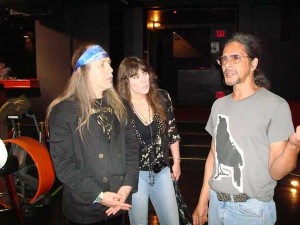
Uli, his girlfriend Liz Vandall (vocalist, Sahara) and artist/guitarist Leon Hendrix (Jimi’s brother)
LRI: Jimi Hendrix would have turned 70 this past November 27th. I know he and that date still mean a tremendous amount to you, any thoughts on this year?
Uli: It’s a big deal artistically because it makes me realize, 70 years is a long time. That’s a full lifetime and time flies, I felt like “Wow”. I remember seeing Jimi live and it feels like it was yesterday and he was only like 26 when I saw him and now so many years have passed. It makes you think and wonder about how an artist like Hendrix continues to exert this influence over the music world and the world at large and even about how it is always waxing and waning, waxing and waning, it goes in waves. His influence will never stop, he was too great for that but recently I did feel like people were not talking about it so much anymore and I realized there had been periods like that in the past where that happened. Inevitably there suddenly comes this big resurgence and people begin rediscovering Jimi Hendrix and he is like everywhere again. It’s very interesting and it’s just one of those things.
LRI: Do you feel that your work with Electric Sun allowed you the opportunity to explore a little bit more of a Hendrix influence compared to your playing on the initial Scorpions albums?
Uli: Oh yeah, absolutely, deliberately so. I was deliberately going into that direction because I felt inspired by the whole concept and vibe of Jimi Hendrix. The man, the message, the music, the lot. I soaked it all up and learned it and made it my own and Electric Sun was very much an outpouring of that but at the same time I also brought in more of the classical overtones than I had ever used in the Scorpions days. On the third album (Beyond The Astral Skies) that really came to the foreground but on the first one there was a definite Hendrix influence.
LRI: You’re considered such an influence on so many of the classic heavy metal guitarists and have certainly been sought out by all kinds of heavy metal journalists and media but you don’t really sound like you relate to the tag yourself do you?
Uli: No, and I have no idea really because I know nothing about that type of music, it’s just not my world. I really had my own Hendrix, Clapton and a little Jeff Beck but after that I really sort of went into my own world and closed my ears to a lot of that and continued on my own path. The dimensions and dynamics of heavy metal to me are lacking and it’s just not subtle enough so I not only have never really listened to it nor can I really even describe it. I suppose if you consider Led Zeppelin as heavy metal then I have, I don’t consider them as heavy metal but they are a great band and one of the blueprints of heavy metal. As for the Scorpions, to me, I guess it’s like an old marriage and I see them as they were but to me, the Scorpions are not a heavy metal band. Of course, after I left they were classified as a metal band but when I was in the band we were always classified as a melodic hard rock band. That term really gained popularity in the 80s when I basically left the scene altogether. It’s just not a genre that I know very much about. I went to a Metallica concert once (laughs). That’s really the extent of my exposure to heavy metal other than meeting a lot of people from metal bands at trade shows
LRI: Going back to Hendrix a bit. So many people appreciate and celebrate some of his more commercial early efforts but he was a very well rounded player who explored jazz, blues and multiple areas. Do you think if he had lived Jimi would have continued to experiment with styles and genres?
Uli: I’m sure he would have done something amazing and would have remained at the forefront of things although the tide of things would have gone against him in the early seventies because a different kind of music was coming and it would have taken him some time. Still, whatever he would have done would have been brilliant and completely way out there and way up there. Which direction he would have went in I do not know but I do know that when he spoke to Monika (Dannemann, the late artist and girlfriend of Hendrix and Uli ) he wanted to take a year off to study music, he wanted to learn to write music and even work with big bands, maybe even orchestras. He certainly wanted to expand in many respects and I know he was tired of the three piece although I also know he sometimes gave conflicting statements.
LRI: There is quite a bit of evolution in his work from gut level stuff like “Foxy Lady” to something like “Message Of Love”. Is that type of evolution something most artists can try to attain on at least some level?
Uli: They should. It’s part of a journey and a development. Hendrix was developing very quickly and he was finding himself. In the beginning he just had all this talent and suddenly had an opportunity and there were songs like “Hey Joe” and “Foxy Lady” which didn’t have a message but musically they were already vintage, classic Hendrix and pure genius. Very quickly, all of his lightbulbs started firing and he began to shine from inside and became aware and become inspired on a higher level. The lyrics reflected that and in fact not many people know this but his next hit song was “Purple Haze” and everybody thinks that’s about drugs. The original “Purple Haze” lyrics were many pages long and it was actually called “Purple Haze, Jesus Saves” and had nothing to do with drugs but was dream inspired. Of course they never used those lyrics because back then that would have been totally uncommercial and Jimi had a very commercially oriented manager Chas Chandler who in that sense was partially responsible for his success because he guided Hendrix during those early years. Even from the second album on, Jimi’s spirituality came more and more to the forefront and by the end you had a full-on message with things like “Machine Gun” and “Star Spangled Banner” and all of that material.
LRI: Thanks for talking to us Uli, one last question. These new shows you are doing are with a large band but you have also even done some orchestral things in the past. Is that something we might see more of from you in the future?
Uli: Absolutely. Right now is not the time for that but in the future I want to get back into that because there is still so much to be said and so much to be discovered in that. It is like a magnet calling me from the distant future but at the moment it is still unfinished business.
Uli Jon Roth tour dates winter 2013
1/21: Los Angeles, CA @ Santa Monica Playhouse *Sky Academy Only*
1/22: Los Angeles, CA @ Santa Monica Playhouse *Sky Academy Only*
1/23: San Francisco, CA @ Slim’s *Jason Becker Event
1/25: Hollywood, CA @ Whiskey A Go-Go
1/26: Santa Ana, CA @ Malone’s
1/27: San Diego, CA @ Brick by Brick *SA
1/29: Denver, CO @ Jammin’ Joe’s
1/31: Milwaukee, WI @ Shank Hall * SA
2/1: Detroit, MI @ Token Lounge *SA
2/2: Cleveland, OH @ Pirate’s Cove at Peabody’s
2/3: Old Bridge, NJ @ Old Bridge Music Center *Sky Academy Only*
2/5: Chantilly, VA @ Sully’s
2/6: New York, NY @ Stage 48 *SA
2/7: White Marsh, MD @ House of Rock *SA
2/8: Montreal, QC @ Le National
2/9: Toronto, ON @ The Rock Pile *SA
2/10: Toronto, ON @ The Rock Pile
2/12: Ottawa, ON @ The Brass Monkey *SA
2/13: Sellersville, PA @ Sellersville Theater *SA
2/15: Kenosha, WI @ Hatrix
2/16: Savage, MN @ Neisen’s Sports Bar & Grill *SA
2/17: Chicago, IL @ Reggie’s Rock Club *SA
2/21: Tempe, AZ @ Club Red
2/22: Las Vegas, NV @ Vamp’d
2/23: Corona, CA @ Marquee 15
2/24: Santa Rosa, CA @ The Last Day Saloon
2/26: Seattle, WA @ El Corazon *SA
2/27: Portland, OR @ Hawthorne Theater *SA
3/1: Concord, CA @ Vinnies
Category: Interviews
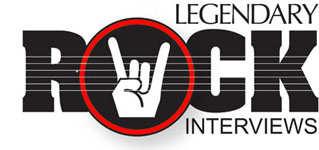



Great interview guys! Uli was a huge inspiration to my playing and over all attitude toward music growing up.
Thanks and Hi to Liz!
Another Great interview . Sensible Questions
Very cool! Uli is a legend! Thanks guys!
I always heard Uli wasn’t a fan of Tokyo Tapes. Personally i love the sound of that record as well as how ‘in the pocket’ Herman Rarebell’s playing is. To his day those versions are still the quintessential example of how phenomenal Uli’s playing was overall, as well as in a live context. Especially considering he had essentially already left the band by that time.
I’ve been a longtime listener and huge fan of Uli’s work (since the ’70s import Scorpions albums became available in the U.S.) and would love to attend his seminar sometime. It’s been a REALLY long time since he’s played a venue in St. Louis, and I’m truly grateful and extremely pleased to have had that concert experience especially from only 10 feet away from the man! Although it was by far one of the loudest shows I’ve witnessed, his sound was unbelievably clear and articulate, and every nuance of his technique and approach to achieving his various feelings through the strings was easily recognized and absorbed. I only wish I had stayed after long enough to meet him and possibly have him sign my guitar. I’ve also got questions for him regarding keeping his guitars in tune with the intense use of the whammy bar. His subtle use of it is often overlooked, although it is indeed a trademark of his style.
I’m so glad he’s continuing his musical quest via the symphony and his academy teachings, as well as revisiting old material which truly made his musical mark in my mind.
Play on, Brother!